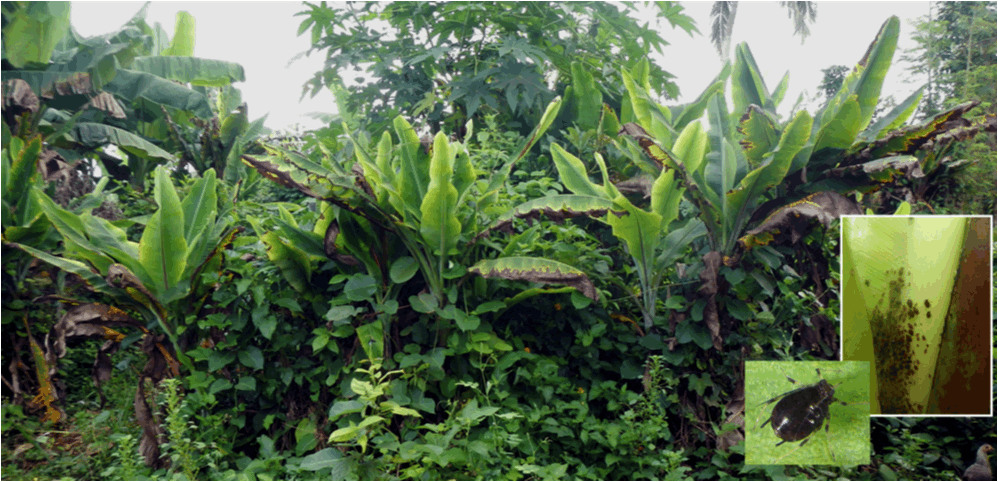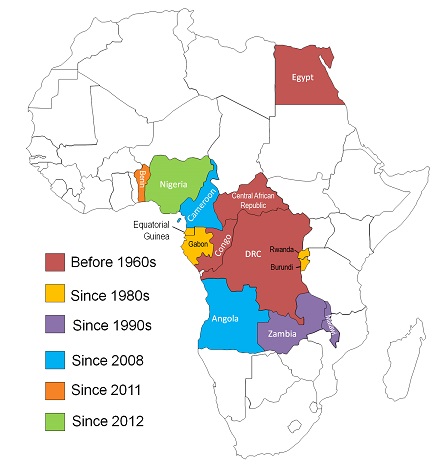Approximately 50 experts from 20 countries have gathered in Bujumbura, Burundi this week to coordinate an ambitious effort to contain the spread of Banana Bunchy Top Disease (BBTD) in Africa and help farmers to recover from the devastation that disease has wrought.
BBTD has spread rapidly across Southern Africa in recent decades, and more recently into West Africa, destroying the productivity of countless hectares of banana and plantain. The disease is caused by a virus that is spread via infected planting material or by an aphid (Pentalonia nigronervosa), which is common in the continent’s banana producing regions. BBTD has been reported in 14 African countries, and 35 countries in the world, but scientists suspect that it might have begun to spread into additional African nations.
Bioversity International, the International Institute of Tropical Agriculture (IITA) and the French Agricultural Research Centre for International Development (CIRAD) have consequently partnered with other international organizations, the private sector and institutions in the affected countries to implemented an RTB-funded project called “BBTD containment and recovery: building capacity and piloting field recovery approaches through a learning alliance.” Participants in the Bujumbura workshop will plan the project’s activities at eight action sites in different countries and agroecologies, general awareness raising and other efforts.
Lava Kumar, a virologist who heads the IITA’s Germplasm Health Unit, explained that one of the biggest challenges of BBTD is that infected plants initially show no symptoms, and by the time the leaves begin to bunch up, the crop has been lost and the virus may well have spread to other farms. This has facilitated the disease’s spread into new regions and across international borders, and has resulted in a generally slow response to a serious threat to food security and livelihoods. Kumar explained that RTB’s support has helped to raise interest and awareness about this ‘insidious disease’ and collaboration of various organizations to control it.
“I have been working on BBTD since 2008, and there has been a huge change in terms of awareness and concern about the disease. Then, our knowledge of the extent of spread and epidemiology was very limited. There were a lot of unanswered questions. We’ve since done a lot of work to demonstrate the importance of this problem and make it more visible,” he said. He added that donors that once considered banana and plantain to be low-priority commodities for investment have recently shown interest in supporting efforts to control banana diseases such as BBTD. “We are galvanizing all this support, and this is happening as a result of the initiative that has been funded by RTB”.
The current project grew out of an RTB workshop organized by IITA and Bioversity in early 2013, in Arusha, Tanzania, where various international experts shared information on the latest developments in controlling BBTD with representatives of African ministries and organizations. The alliance that was formalized at that meeting began collaborating on efforts to raise awareness in the region and on the proposal for the current project. Kumar emphasized that the partnership between Bioversity and IITA facilitated mobilizing support and networking to combat BBTD in sub-Saharan Africa (SSA).
Kumar said that they dubbed their collaboration a ‘learning alliance’ because partners will implement a combination of various control measures within eight different agroecologies in SSA, and their effectiveness is likely to vary. Scientists will analyze the initial results and then adapt the strategies accordingly. He explained that national agricultural research institutions in each country will manage the action sites while the RTB centers coordinate the project, train local staff, and provide access to resources such as clean planting material and diagnostic reagents.
Kumar observed that a shortage of monitoring skills and knowledge of BBTD in many countries has facilitated the disease’s spread, so the project has prioritized training and public awareness. In the coming months, IITA, Bioversity and CIRAD will organize a training course at the CIRAD campus in Montpellier on detection of the virus for national partners from the affected countries, in order to help develop a capacity for monitoring and certification of planting material.
“We expect more success stories as the project progresses, but the simple fact that we’ve raised awareness about this problem and formed a learning alliance is already an achievement,” Kumar said.

